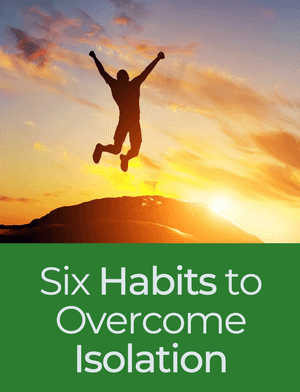
Get the Six Habits for Overcoming Isolation Guide for free


In today's busy world, fueled with anxiety and stress, many people seek relief through substances. You might smoke weed after a long day to relax or have a snack to distract yourself from feeling lonely. Maybe you turn to prescription drugs to finally get some "quality sleep," or perhaps stimulants to keep you focused during the day.
Listen to the podcast version here
Using substances such as alcohol or drugs in this manner - to manage symptoms of mental health, is known as "self-medicating." Maybe you're perfectly aware you have mental health issues, such as being under too much chronic stress, but you're not aware of any healthier ways to cope.
While self-medicating can undoubtedly offer relief from discomfort in the short term, your struggles will gradually compound and increase in the long term. Whether you use alcohol, drugs, or prescriptions, the habit of self-medicating can lead to addiction and increased mental health problems.
I have struggled with weed usage ever since I was discharged from the U.S. Air Force. Having lived in two countries, seven states, and many different cities, I never successfully built a community around me and thus never had a sense of truly belonging.
I always told myself I consumed weed to relax, but the truth is that I wasn't acknowledging the feelings of loneliness and merely used it to numb myself to the pain. I felt inadequate and unloved; smoking weed was easier than confronting my struggles.
Things started changing when I fixed my diet and sleep, exercised properly, got out in nature frequently, and created awareness around my usage. At that point, I was able to develop more meaningful relationships and show up as a better friend.
The sense of belonging and community that followed gave me the strength to tackle my self-medication habits and reduce my usage so that it no longer negatively impacts other areas in my life.
When "negative" feelings such as hopelessness, fear, and sadness start to interfere with the quality of your daily life, you may need help with an underlying problem or condition. Some turn to substance use to cope with unresolved issues or traumas from the past.
For most of us, seeking treatment is embarrassing because we have always been told to project an image of strength and perfection. So it can be tempting to find our coping mechanisms by reaching for a drink, swallowing some pill, or finding other quick fixes.
Alcohol is most commonly used for self-medication since it's so widely available and culturally accepted. People may be tempted to use alcohol to lessen depression - even though alcohol is a depressant and will only worsen the symptoms.
Recreational drugs such as weed, cocaine, and amphetamines are used to suppress anxiety, numb pain, and increase focus. Again, these work in the short term but only serve to borrow happiness from the future.
Prescription drugs such as ADHD medication and opiates are readily available and frequently used to numb pain and elevate focus. Some prescriptions are genuinely needed, but some are used to self-medicate.
Emotional eaters can use food to squash uncomfortable emotions and avoid stress, anxiety, and depression. Emotional eating typically consists of foods high in sugar, unhealthy fats, and processed ingredients, wreaking further havoc on your body.
It may not always be easy to determine when you're self-medicating. Alcohol is highly prevalent in our culture, along with legalized weed and doctors writing prescriptions for anything and anyone. To understand when you're self-medicating, you need to examine your motives for consuming drugs.
Ask yourself the following questions to gain a better understanding of your motives:
Do you consume drugs during times of stress, anxiety, or sadness? Almost everyone has used some substance or another to cope with occasional hardship. Still, if you regularly use drugs to cope with uncomfortable emotions or relieve boredom, then you may be self-medicating.
Do drugs make you feel even worse? Drugs only work temporarily without resolving any underlying issues, so you may feel worse after the numbing effects have worn off.
Do you increase the dosage to feel relief? At first, it may have taken only one drink or one hit to ease your anxiety or release some stress at the end of the day. As you continue to self-medicate, your body will naturally build up a tolerance causing you to increase your dosage to feel the same effects.
Do you feel anxious when you don't have access to drugs? If you worry about how you'll cope with certain situations without access to drugs, the more likely it is you are using drugs to self-medicate.
Do your problems only seem to be increasing in complexity and severity? You may have started to medicate with drugs to cope with temporary stress, but now it may seem like your problems have only gotten bigger. The more you avoid the root causes of your issues by self-medicating, the bigger your problems become.
Self-medicating your issues can create many more problems beyond the risk of becoming addicted; it can also:
Exacerbate symptoms. The habit of self-medication can worsen existing symptoms, such as sadness and anxiety, and even introduce new symptoms due to the side effects of the drug of your choice.
Interact with other drugs. The consumption of drugs can interact with any other medications you're taking - either canceling their effectiveness or further increasing side effects.
Create new mental health problems. If you're already at risk for a mental health disorder due to genetics or environment, consuming drugs can potentially lead to the development of new mental health problems beyond those that caused you to self-medicate in the first place.
Prevent you from seeking professional help. When you're in the habit of self-medicating, it can be challenging to admit your mistakes and redirect your focus on the underlying issues of your use, especially if you feel that doing so is hopeless or embarrassing.
The first step in finding more natural and effective ways to deal with uncomfortable emotions is the ability to recognize when and how you're self-medicating.
Be honest with yourself - don't give in to the urge to rationalize your behavior or underestimate how much or how often you use substances such as alcohol as an escape.
You may be tempted to blame your friends, significant other, coworkers, or boss for your troubles in life, but you need to acknowledge that the time and financial resources spent on alcohol and drugs are also contributing factors.
Admitting you have a mental health problem isn't weakness; it takes incredible strength and courage. Whatever issues you are facing, you don't have to do it alone. Don't be afraid to ask for help; you'll only regret not trying.
Once you are aware of how often and why you use substances, it's time to ask yourself if your beliefs about your use are valid. If you self-medicate to regulate your emotions, chances are that you view your habit of self-medication as more helpful than it really is.
For example, you may smoke weed before bed because you believe it helps you sleep. While it can help you to fall asleep more quickly, weed decreases the amount of time you spend in REM sleep, the sleep phase associated with dreaming, processing emotions, and cementing new memories.
Similarly, while a drink or two can calm your nerves in the moment, alcohol will ultimately make you feel more sad and more anxious because it is a depressant. Regular alcohol consumption, even in small amounts, decreases serotonin levels, aggravates breathing problems, and causes you to wake up earlier than usual.
Even when you realize your substance use is only serving to hide the symptoms of your problems rather than directly solving them, it can be challenging to let go of the beliefs you have and are comfortable with. The more awareness you create by challenging those beliefs, the less grip they will have over you in the future.
While it may seem like you're powerless against the struggles in life and that substances take some of the sting away, you can take steps to improve how you live and feel - with or without professional help.
Get your body moving. Exercise triggers powerful changes in the brain that can reduce tension and anxiety, improve your mood, promote feelings of calm, and energize you. Exercising is also an excellent distraction, enabling you to break out of vicious negative-thought cycles.
Integrate a mindfulness practice. Meditation, breathing, and yoga can help release tension and leave you feeling more positive throughout the day. What you do doesn't matter; anything that enables you to disconnect and relax will do.
Eat a healthy diet. If you consume garbage, you will feel like and produce garbage. The cells in your body consist of the foods you consume, so cut down on sugar and junk food, and eat more fresh fruits, beans, berries, nuts, and vegetables.
Get quality sleep. A lack of sleep can exacerbate the symptoms of anxiety, depression, and stress - just like substances can make it harder to get high-quality sleep. Try to get seven to eight hours of sleep per night and wake up at sunrise so your body can adequately regulate your circadian rhythm and metabolism.
Get outside in nature. Being outdoors helps you disconnect from all the stimulants you experience daily, which are probably the triggers for your self-medication in the first place. Go for a walk, or better yet, spend a few hours per week in nature without access to any devices.
Build and rely on your community. The most effective way to calm your central nervous system is by spending time with friends or loved ones. Most self-medication habits have feelings of loneliness or inadequacy at their core. Instead of creating more distance between yourself and others by using substances, try to find more meaningful interactions with people that matter to you.
I used to feel like the empty shell of a person just going through the motions of life. People jokingly referred to me as a robot and described me as overly logical without any apparent emotions. I was depressed, anxious, and didn't understand the point of being alive.
I learned the importance of analyzing my needs and wants, consuming information and resources that got me excited about life, doing what needed to be done to close the gap with where I wanted to be, and finding rest within myself to be free from anxiety and disturbances. I also learned how to trust myself and to rely on a solid group of friends allowing me to tap into an enormous amount of strength.
I summarized everything I learned in the Six Habits for Conquering Anxiety and Depression e-book to help you make the same journey. You can sign up for my newsletter on the bottom of this page to receive blog updates (never spam), and you will receive the ebook for free.

Get the Six Habits for Overcoming Isolation Guide for free